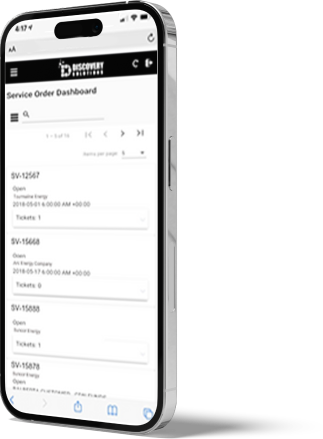Technology that Every OFS Company Will Need in 2023



In 2023, there will be a push for oilfield services companies to accelerate adoption of certain technologies in order to keep pace with oil and gas and the energy sector as a whole. The acceleration of digital transformation in the industry means those who don’t stay on top of these are at risk of getting left behind.
These technologies will include automation, digital field ticketing, and a true industry specific ERP software system. Analogue systems won’t cut it in 2023.
What is Digital Transformation?
The Oilfield Services Sector, like every other sector, is changing rapidly. Digital transformation is affecting everything about the way we operate and do business.
If you’re not familiar with the term “digital transformation,” it refers to the movement towards a digital-first approach to business. A 2017 CIO article defined digital transformation as “application of digital capabilities to processes, products, and assets to improve efficiency, enhance customer value, manage risk, and uncover new monetization opportunities.” Digital capabilities are defined as “electronic, scientific, data-driven, quantified, instrumented, measured, mathematic, calculated and/or automated” systems or solutions.
In 2019, JourneyApps noted an increased push within the oil and gas industry to embrace digital transformation, which had until that time been lagging behind other sectors (like finance, which was one of the faster sectors to move forward into the new era). Jim Crompton, author of the book A Digital Journey: The Transformation of the Oil and Gas Industry, wrote that the push was fueled by “the realization that digitization brings with it a competitive advantage, and failure to embrace new technology means losing out on business.”
In 2020, according to Ernst & Young, the top five digital technologies in use within in the oil and gas industry were:
- Remote monitoring
- Mobile platforms/apps
- Cloud computing
- Operational technology
- Advance analytics
More recently, talk is revolving around artificial intelligence (AI) and machine learning (ML) and the internet of things (IoT) technologies. The latter allows companies to actively monitor overall systems, streamline maintenance procedures, and improve safety. Drones, meanwhile, are being used to inspect network pipelines, undertake dangerous tasks in operational areas, and to monitor and mitigate oil spill incidents with accurate GPS locations.
Small to Medium Sized Companies Joining the Digital Transformation Movement
With the oil and gas industry as a whole embracing digital transformation, it’s become increasingly important for the oilfield services sector to keep pace. Antiquated analogue systems are not going to cut it when everyone around us is moving towards faster, leaner, and more advanced solutions. Oil and gas companies that have adopted such solutions themselves will expect the same of their service providers.
By 2022, the oilfield services world has largely caught on to the importance of digital transformation. According to an article by Protiviti, even late adopters were embracing artificial intelligence, machine learning, predictive maintenance, and other digital solutions by then.
“These technologies are not so new to the major oilfield service firms, which have typically had the financial resources to be early adopters. But thanks to recent events, midmarket oilfield service companies have the opportunity to add digital tools as they seek greater efficiency,” the article stated.
This more widespread adoption was fueled by the market volatility caused by the COVID-19 pandemic – as was the case with any industry that was slow to adopt – at which time (it’s been said in a variety of ways) tech adoption accelerated to the rate of “decades in days.”
“The decline in oil prices in early 2020 that followed the COVID-19 lockdowns forced oilfield service firms to slim down operations, and technology helped the organizations do more with less.” A 2022 boom allowed midmarket companies to commit more capital toward implementing and expanding digital transformation, setting themselves up to be better prepared for future major disruptions.
Moving forward, these are the technologies OFS companies will need to use in 2023.
Automation technology
Efficiency is paramount in this day and age and automation will play a key role in maximizing this efficiency as it reduces time and labour costs. Companies are catching onto the fact that they need to operate more efficiently and that disruption can happen at any time, meaning there’s nothing left to waste on unnecessary labour costs. In this quest to do more with less, OFS companies are increasing automation, while investment into tech that facilitates automation is expected to increase in the foreseeable future.
This applies to manufacturing, distribution, rentals and field Services. Automation in all of these areas can change the way you do your inventory, accounting, ticketing, and more, driving productivity and making your business more scalable – a must in a volatile market where there is still room for growth. Discovery Solutions’ Oilfield Service Module, for example, supports field service and equipment repair businesses by automating your business workflows from quote to invoice while our digital field ticketing and invoicing automation integrates directly into your ERP.
It’s high time to give up the archaic method of using Excel or Google Sheets with pen and paper, and leverage a true automation platform within a dedicated software designed for your industry.
Automation reduces turnaround time from start to finish, keeping things moving and customers happy. When what can be automated is automated, you can focus on job specifics and business growth.
Digital Ticketing
Writing out manual tickets with pen and paper takes time, leaves room for error, and creates inefficiencies that can add up to big costs for your company. Oilfield ticket software is a digital solution to better capture your remote field activity and costs. Digital ticketing, like Discovery's Field Ticket System, allows field staff to enter the results of a job remotely, while in the field, and produce and send a priced field ticket for the customer to sign, which can be done digitally. The information is then sent via an internet connection to Discovery’s ERP system for review and invoicing. This streamlines operations, saves time, and reduces the potential for errors and lost tickets, reducing the cash conversion cycle and keeping activity flowing. The field ticket program also allows field staff to enter their hours which simplifies the payroll process and can be used when analyzing job cost history reports. Sending electronic invoices to oil and gas producers saves them from having to manually enter the invoice into their systems.
Field Service operates on any device and does not need to be connected to the internet for users to input data. This allows users to work at locations with no internet and not worry about losing important information. The data will automatically sync when connected back to the internet.
True Industry-Specific ERP Software
Enterprise Resource Planning (ERP) is business management software used to manage essential parts of a business and streamline processes through integration and automation. These days, a true ERP is cloud based, easy to use, and easily accessible for everyone who needs to use it at your organization.
As niche software solutions become more common across industries, there’s no need to make do with what you can get, like non-industry specific accounting software combined with spreadsheets and/bolt on solutions. Discovery helps our clients take control of their company’s operations and finances with a cloud-based ERP solution to be used at all levels of the organization.
Many of our customers come to us after struggling to make things work with QuickBooks, Excel, and pen-and-paper, and we make the transition of switching simple and easy. These inefficient systems lead to difficulties controlling inventories, people, and costs. They leave room for error, lack financial transparency, and can hold up cash conversion cycles. Companies may find themselves hiring additional resources to manage these inefficient processes and will certainly be leaving value on the table.
Generic ERP systems are not sufficient. They can be more expensive and are less effective. Discovery Solutions is designed for OFS companies that design, build, distribute and either sell, rent, or service equipment.
With a true OFS ERP you need a single solution that can handle:
Field Service Management & Field Ticketing
Inventory & Rentals
Manufacturing Optimization
Distribution Optimization
Accounting & Reporting
Discovery Management Software’s all-in-one oilfield ERP is designed for small and medium sized businesses looking to streamline operations or scale.

Book a Call





